#Passive income ideas without investment
Text
Zero-Cost Online Earning: Unleash Your Income Potential Without Investments
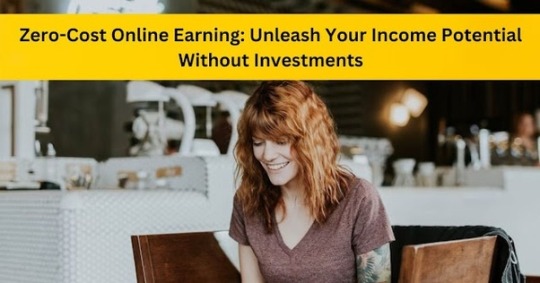
Discover legitimate and no-cost methods to earn money online without investment. Explore quick and easy ways to generate income from home, with a focus on passive income and genuine online jobs. Start your online earning journey today!
Read more >>
#Online-earning-methods-investment#earn money online without investment#Legit ways to earn money online for free#Easy online money-making ideas no investment#Quick ways to make money online without investment#Passive income ideas without investment#Genuine online jobs without investment#Earn money online without paying anything#No-cost online earning opportunities#Work from home without investment#Zero investment online businesses
0 notes
Text
30 Easy ways make money💰 💸
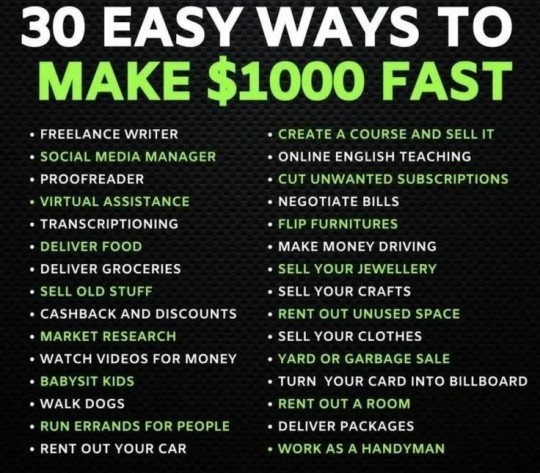
#make money from home#earn money online#earn real money#earnings#how to earn money#how to earn online#how to earn passive income#how to earn without investment#make money for free#make money online#online earning#sidehustle#side hustle#side hustle ideas
32 notes
·
View notes
Text
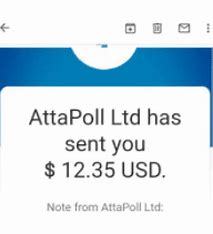
WANT TO $12 IN JUST 5 MINUTES BY DOING SIMPLE SURVEY WANT TO KNOW MY SECRET TO MAKE 6 FIGURE INCOME EVERY MONTH BY DOING THIS
CLICK HERE-https://bit.ly/3MMKfeq
#free money#survey#make money from home#earn money online#earn real money#earnings#how to earn money#how to earn online#how to earn passive income#how to earn without investment#make money for free#make money online#online earning#sidehustle#side hustle#side hustle ideas
2 notes
·
View notes
Text
#Make Money From Home#Make Extra Money#extra money#money hacks#passive income#way to make money#earn passive income#earn money without investment#make money ideas
2 notes
·
View notes
Text
Google is (still) losing the spam wars to zombie news-brands
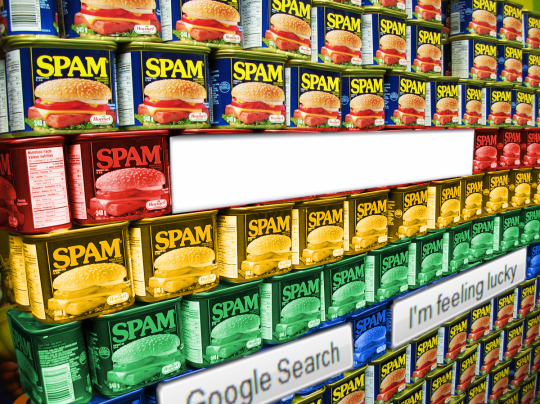
I'm touring my new, nationally bestselling novel The Bezzle! Catch me TONIGHT (May 3) in CALGARY, then TOMORROW (May 4) in VANCOUVER, then onto Tartu, Estonia, and beyond!

Even Google admits – grudgingly – that it is losing the spam wars. The explosive proliferation of botshit has supercharged the sleazy "search engine optimization" business, such that results to common queries are 50% Google ads to spam sites, and 50% links to spam sites that tricked Google into a high rank (without paying for an ad):
https://developers.google.com/search/blog/2024/03/core-update-spam-policies#site-reputation
It's nice that Google has finally stopped gaslighting the rest of us with claims that its search was still the same bedrock utility that so many of us relied upon as a key piece of internet infrastructure. This not only feels wildly wrong, it is empirically, provably false:
https://downloads.webis.de/publications/papers/bevendorff_2024a.pdf
Not only that, but we know why Google search sucks. Memos released as part of the DOJ's antitrust case against Google reveal that the company deliberately chose to worsen search quality to increase the number of queries you'd have to make (and the number of ads you'd have to see) to find a decent result:
https://pluralistic.net/2024/04/24/naming-names/#prabhakar-raghavan
Google's antitrust case turns on the idea that the company bought its way to dominance, spending the some of the billions it extracted from advertisers and publishers to buy the default position on every platform, so that no one ever tried another search engine, which meant that no one would invest in another search engine, either.
Google's tacit defense is that its monopoly billions only incidentally fund these kind of anticompetitive deals. Mostly, Google says, it uses its billions to build the greatest search engine, ad platform, mobile OS, etc that the public could dream of. Only a company as big as Google (says Google) can afford to fund the R&D and security to keep its platform useful for the rest of us.
That's the "monopolistic bargain" – let the monopolist become a dictator, and they will be a benevolent dictator. Shriven of "wasteful competition," the monopolist can split their profits with the public by funding public goods and the public interest.
Google has clearly reneged on that bargain. A company experiencing the dramatic security failures and declining quality should be pouring everything it has to righting the ship. Instead, Google repeatedly blew tens of billions of dollars on stock buybacks while doing mass layoffs:
https://pluralistic.net/2024/02/21/im-feeling-unlucky/#not-up-to-the-task
Those layoffs have now reached the company's "core" teams, even as its core services continue to decay:
https://qz.com/google-is-laying-off-hundreds-as-it-moves-core-jobs-abr-1851449528
(Google's antitrust trial was shrouded in secrecy, thanks to the judge's deference to the company's insistence on confidentiality. The case is moving along though, and warrants your continued attention:)
https://www.thebignewsletter.com/p/the-2-trillion-secret-trial-against
Google wormed its way into so many corners of our lives that its enshittification keeps erupting in odd places, like ordering takeout food:
https://pluralistic.net/2023/02/24/passive-income/#swiss-cheese-security
Back in February, Housefresh – a rigorous review site for home air purifiers – published a viral, damning account of how Google had allowed itself to be overrun by spammers who purport to provide reviews of air purifiers, but who do little to no testing and often employ AI chatbots to write automated garbage:
https://housefresh.com/david-vs-digital-goliaths/
In the months since, Housefresh's Gisele Navarro has continued to fight for the survival of her high-quality air purifier review site, and has received many tips from insiders at the spam-farms and Google, all of which she recounts in a followup essay:
https://housefresh.com/how-google-decimated-housefresh/
One of the worst offenders in spam wars is Dotdash Meredith, a content-farm that "publishes" multiple websites that recycle parts of each others' content in order to climb to the top search slots for lucrative product review spots, which can be monetized via affiliate links.
A Dotdash Meredith insider told Navarro that the company uses a tactic called "keyword swarming" to push high-quality independent sites off the top of Google and replace them with its own garbage reviews. When Dotdash Meredith finds an independent site that occupies the top results for a lucrative Google result, they "swarm a smaller site’s foothold on one or two articles by essentially publishing 10 articles [on the topic] and beefing up [Dotdash Meredith sites’] authority."
Dotdash Meredith has keyword swarmed a large number of topics. from air purifiers to slow cookers to posture correctors for back-pain:
https://housefresh.com/wp-content/uploads/2024/05/keyword-swarming-dotdash.jpg
The company isn't shy about this. Its own shareholder communications boast about it. What's more, it has competition.
Take Forbes, an actual news-site, which has a whole shadow-empire of web-pages reviewing products for puppies, dogs, kittens and cats, all of which link to high affiliate-fee-generating pet insurance products. These reviews are not good, but they are treasured by Google's algorithm, which views them as a part of Forbes's legitimate news-publishing operation and lets them draft on Forbes's authority.
This side-hustle for Forbes comes at a cost for the rest of us, though. The reviewers who actually put in the hard work to figure out which pet products are worth your money (and which ones are bad, defective or dangerous) are crowded off the front page of Google and eventually disappear, leaving behind nothing but semi-automated SEO garbage from Forbes:
https://twitter.com/ichbinGisele/status/1642481590524583936
There's a name for this: "site reputation abuse." That's when a site perverts its current – or past – practice of publishing high-quality materials to trick Google into giving the site a high ranking. Think of how Deadspin's private equity grifter owners turned it into a site full of casino affiliate spam:
https://www.404media.co/who-owns-deadspin-now-lineup-publishing/
The same thing happened to the venerable Money magazine:
https://moneygroup.pr/
Money is one of the many sites whose air purifier reviews Google gives preference to, despite the fact that they do no testing. According to Google, Money is also a reliable source of information on reprogramming your garage-door opener, buying a paint-sprayer, etc:
https://money.com/best-paint-sprayer/
All of this is made ten million times worse by AI, which can spray out superficially plausible botshit in superhuman quantities, letting spammers produce thousands of variations on their shitty reviews, flooding the zone with bullshit in classic Steve Bannon style:
https://escapecollective.com/commerce-content-is-breaking-product-reviews/
As Gizmodo, Sports Illustrated and USA Today have learned the hard way, AI can't write factual news pieces. But it can pump out bullshit written for the express purpose of drafting on the good work human journalists have done and tricking Google – the search engine 90% of us rely on – into upranking bullshit at the expense of high-quality information.
A variety of AI service bureaux have popped up to provide AI botshit as a service to news brands. While Navarro doesn't say so, I'm willing to bet that for news bosses, outsourcing your botshit scams to a third party is considered an excellent way of avoiding your journalists' wrath. The biggest botshit-as-a-service company is ASR Group (which also uses the alias Advon Commerce).
Advon claims that its botshit is, in fact, written by humans. But Advon's employees' Linkedin profiles tell a different story, boasting of their mastery of AI tools in the industrial-scale production of botshit:
https://housefresh.com/wp-content/uploads/2024/05/Advon-AI-LinkedIn.jpg
Now, none of this is particularly sophisticated. It doesn't take much discernment to spot when a site is engaged in "site reputation abuse." Presumably, the 12,000 googlers the company fired last year could have been employed to check the top review keyword results manually every couple of days and permaban any site caught cheating this way.
Instead, Google is has announced a change in policy: starting May 5, the company will downrank any site caught engaged in site reputation abuse. However, the company takes a very narrow view of site reputation abuse, limiting punishments to sites that employ third parties to generate or uprank their botshit. Companies that produce their botshit in-house are seemingly not covered by this policy.
As Navarro writes, some sites – like Forbes – have prepared for May 5 by blocking their botshit sections from Google's crawler. This can't be their permanent strategy, though – either they'll have to kill the section or bring it in-house to comply with Google's rules. Bringing things in house isn't that hard: US News and World Report is advertising for an SEO editor who will publish 70-80 posts per month, doubtless each one a masterpiece of high-quality, carefully researched material of great value to Google's users:
https://twitter.com/dannyashton/status/1777408051357585425
As Navarro points out, Google is palpably reluctant to target the largest, best-funded spammers. Its March 2024 update kicked many garbage AI sites out of the index – but only small bottom-feeders, not large, once-respected publications that have been colonized by private equity spam-farmers.
All of this comes at a price, and it's only incidentally paid by legitimate sites like Housefresh. The real price is borne by all of us, who are funneled by the 90%-market-share search engine into "review" sites that push low quality, high-price products. Housefresh's top budget air purifier costs $79. That's hundreds of dollars cheaper than the "budget" pick at other sites, who largely perform no original research.
Google search has a problem. AI botshit is dominating Google's search results, and it's not just in product reviews. Searches for infrastructure code samples are dominated by botshit code generated by Pulumi AI, whose chatbot hallucinates nonexistence AWS features:
https://www.theregister.com/2024/05/01/pulumi_ai_pollution_of_search/
This is hugely consequential: when these "hallucinations" slip through into production code, they create huge vulnerabilities for widespread malicious exploitation:
https://www.theregister.com/2024/03/28/ai_bots_hallucinate_software_packages/
We've put all our eggs in Google's basket, and Google's dropped the basket – but it doesn't matter because they can spend $20b/year bribing Apple to make sure no one ever tries a rival search engine on Ios or Safari:
https://finance.yahoo.com/news/google-payments-apple-reached-20-220947331.html
Google's response – laying off core developers, outsourcing to low-waged territories with weak labor protections and spending billions on stock buybacks – presents a picture of a company that is too big to care:
https://pluralistic.net/2024/04/04/teach-me-how-to-shruggie/#kagi
Google promised us a quid-pro-quo: let them be the single, authoritative portal ("organize the world’s information and make it universally accessible and useful"), and they will earn that spot by being the best search there is:
https://www.ft.com/content/b9eb3180-2a6e-41eb-91fe-2ab5942d4150
But – like the spammers at the top of its search result pages – Google didn't earn its spot at the center of our digital lives.
It cheated.

If you'd like an essay-formatted version of this post to read or share, here's a link to it on pluralistic.net, my surveillance-free, ad-free, tracker-free blog:
https://pluralistic.net/2024/05/03/keyword-swarming/#site-reputation-abuse

Image:
freezelight (modified)
https://commons.wikimedia.org/wiki/File:Spam_wall_-_Flickr_-_freezelight.jpg
CC BY-SA 2.0
https://creativecommons.org/licenses/by-sa/2.0/deed.en
#pluralistic#google#monopoly#housefresh#content mills#sponcon#seo#dotdash meredith#keyword swarming#iac#forbes#forbes advisor#deadspin#money magazine#ad practicioners llc#asr group holdings#sports illustrated#advon#site reputation abuse#the algorithm tm#core update#kagi#ai#botshit
848 notes
·
View notes
Note
Hello, long time follower just on other platforms and I love your work. I am currently getting my Masters in Comics and Graphic Novels, and do tell me if this an inappropriate question but how much do you make? Like a month doing comics and art? Also what do you do on a day to day basis? I'm worried about my future after I graduate.
Thank you so much! This is a great question, and I wish more people would be candid about answering it because I'd like creators to demand more money. This will be a very long post! Keep reading if you're interested. MASSIVE info dump below.

I think earnings in comics and books can look wildly different for almost every creator, and it depends on a lot of things. With that in mind, I make a slightly different amount every year. I view my finances mostly through page rates, contracted projects, and passive-ish income. Because I'm terrible at math, I'm just going to tell you how much I make per contracted projects, plus some relevant information in terms of Life Stuff. This will be very long, and I will highlight some important details that people maybe don't like to talk about very much.
Please also bear in mind that I live in Minnesota, away from all my major publishers and editors who are situated on the coasts, so my cost of living is much more manageable.
Background: Building a Foundation (2012-2018)
I graduated from college in 2012 and lived with my parents until 2018. I did not have to pay rent or worry about food, so I got to save up a lot of money to invest in developing as an artist–paying for printing zines, making merch, travel to conventions, table costs, and secure hotel accommodations. This helped enormously, and I would not have been able to spend six years developing my portfolio and connecting with comics peers and professionals without my parents. They were very supportive, even if they had no idea that I was developing professionally as an artist (LOL, they're very proud of me now, but they truly just thought I was being a weird internet gremlin the whole time). They're also not wealthy people by any means. My parents immigrated to the US in their 20s as refugees with absolutely no money and one baby (it me, I am the baby), but they each became pretty successful small-business owners in their own right and were able to help put me through school with minimal debt, even through the financial crisis in the late aughts.
I started making art in 2012-ish as well, but only semi-professionally, and barely on purpose. I was employed full-time in a non-art job between 2013 and 2018 at a local non-profit that specialized in pediatric therapy. I occupied a role as their front office person/corporate assistant. I made about 40k a year at that job, with benefits, and I made a negligible amount of money doing art and making comics. I should also note that throughout this time, I was working 40 hours a week at my day job, commuting between 2-4 hours a day depending on the weather (my commute was an hour for each direction in good weather and up to three hours if it snowed), and then working on comics for 3-4 hours in the evening, every evening. This meant that I would frequently be working anywhere between 65-85 hours a week for five years, and I do not recommend this! I burned out pretty bad! I didn't go to art school or learn about comics, either, so I felt like I had to spend time building my portfolio to make up for lost time. I didn't even know I wanted to make comics until maybe two years after I graduated from undergrad.

I did manage to build a nice portfolio and connect with people who were making the sort of work I liked to make, so the portfolio-building did help. I posted regularly online in different platforms and steadily grew an audience over the years via Tumblr (heyyy!) Instagram (which I personally loathe), Patreon (stressful, but necessary and also getting more comfortable to use!), and Twitter (which I have very mixed feelings about, but I'll miss it if it dies). I did a few short comics with writers whose work I admired. The Fresh Romance Anthology in 2015 was my first major published work, and it was with writer Marguerite Bennett, who remains one of my absolute favorite people. I was so inexperienced at the time, and she would check in with me to make sure I got paid for my work, and then she would follow up with everyone responsible if I was not properly compensated. Not everybody is this on-the-ball about making sure their colleagues are treated well, and she absolutely set the bar for me going forward.
Doing It For Real + Some Numbers (2018-2021)
In 2018, I put together a pitch document for The Magic Fish (if you'd like to see my pitch document, here is a Dropbox link to it! It's just a book report for a book that doesn't exist yet, and I hope you find it helpful if you need it), shopped around for an agent, and found one I'm very happy with (Kate McKean at Morhaim! She's amazing! She runs a newsletter where she gives you the lowdown on how the publishing industry works, so if you're interested in Books, you can check out her writing over at Agents and Books). Then my agent shopped the pitch around to editors and publishers, and Random House Graphic won out. Also, every time she negotiates a contract for me in my home market (the US), she gets 15% cut, which is entirely worth it to me. She does so much. It's incredible.

Random House Graphic's offer wound up being for two books at $45k each, with pretty standard royalty rates, I think around 10% in general, though there are stipulations around royalties that I can't remember off the top of my head (and also bear in mind that you do not earn royalties until your book sales have earned out your advance, and not all published books earn out). To me, this is a lot of money! BUT the graphic novel took two full years to make, so that $45k needed to last me until 2020, which is not livable if you're on you're own. Also, the advance is paid out in chunks at certain milestones of project completion. I'd get a few thousand at a time for the script, another few for the thumbnails, more for the inks, and on and on until the book is done. I would not start to get paid for the second book until I started working on it.
Earlier in 2018, I'd moved in with my partner, so we managed paying the bills and groceries together. Luckily for me, I had also completed a full tarot deck as a separate personal art project to help build my confidence as an illustrator, and my agent sold the tarot deck project (The Star Spinner Tarot) to a different publisher for a $15k advance, so I had some extra wiggle room in 2018. I quit my day job because this was a rare instance in which a book deal provided me with enough money to live on making art, with the caveat that I shared financial responsibilities with my partner. By this time, my Patreon, which I started back in 2015 I think, was also earning anywhere between $800-$1000 a month, which was really great semi-passive income. I'd post process shots and WIPs a couple times a week, and that really helped from month to month.
In 2020, The Magic Fish was published and got a lot of really lovely press. It debuted on the Indie Best-Seller list, and it got pretty popular in schools and libraries. Suddenly, my responsibilities expanded to also being a public speaker (side note: if you make a book about topics of some academic interest, make a generic powerpoint presentation about it now! I'm so serious!). I stopped tabling at conventions (the pandemic), but I would also be paid for speaking gigs in between. I'm not an enormously in-demand public speaker, so I usually asked for an honorarium of about $500 from schools and institutions for online appearances, though I'm about to ask for a lot more because it's cutting into a lot of the time I need to make comics and hit my deadlines. As people are more comfortable meeting in person, I usually ask for a speaking fee of at least $1500, and it must be after they've already taken care of my travel and accommodations. I'm not very well versed in the standards for speaking fees for debut authors, so this might not be standard! It's just my best estimation of the value of my time and effort for that instance.
Speaking of comics and deadlines, I sometimes take on smaller projects for DC (you might have seen these) and Marvel (shhh it's not been announced yet), and the page rates for those, as they've paid me, are usually as follows: $90 per page for writing ($45 for plotting and $45 for scripting), $160 for pencils per page, and $90 for inking per page. I've never colored or lettered, so I don't know those rates. I do regularly talk to other writers and artists, and the rates for writers are all over the place and seem to depend on whether you've signed an exclusive contract with either of those companies. I don't know what a contracted penciller or inker is paid by them, or if that's even a thing that happens? I also sometimes do comics cover work, and I usually charge between $1200 and $1500. I tend to charge a bit more for covers these days because I personally don't like doing covers all that much.

Starting to Reap the Benefits Maybe? (2021-2022)
In 2021, I started getting royalty checks for both Star Spinner Tarot and The Magic Fish. These payments will vary wildly, and I think they will naturally peter off as time goes on, and I'll need to make more books and projects. In both cases, I was surprised. I think at one point a random check hit my bank account for like $20k and I nearly fainted, but some of the other royalty checks will be much more modest. This process of getting paid is also immensely eased by having a good agent! I cannot stress this enough!
Then both the Star Spinner Tarot and The Magic Fish got foreign language licenses, and those come with small advances of their own, each between $2k and $3k, from what I can recall, with varying royalty rates depending on the publisher who acquired those rights. Those royalty rates are, in my limited experience, more modest than my American publisher's, come to around 7% or 8%. The Star Spinner Tarot got an official French edition, and The Magic Fish has been licensed for publication in Italian, French, Korean, Brazilian Portuguese, and Spanish so far.
Since 2021, I've also signed on to draw two more graphic novels for other people, and my agent is able to demand higher advances for me, even when I'm only doing the drawing part.

My Day-to-Day
I think that's about as comprehensive as I can be about numbers. On a daily basis, my schedule depends on whether I'm writing or drawing. Graphic novels are long projects. I'll be writing for months at a time and then drawing for even more months or even years after. I spend a lot of time answering emails for speaking requests, and my agent will sometimes pass along emails about legitimate project requests (another advantage of having an agent is I don't have to sift through scam emails or shady collaborators). I spend way more time answering emails and trying to iron out my calendar than I'd like.
I'm currently working on my second graphic novel for Random House Graphic, and I'm extremely excited about it.
Another thing I've learned is that I like to bounce between projects, but they have to be between a paid project and a personal project. If I'm juggling paid projects, I get overwhelmed and stressed. If I can work on a paid project and then also make personal art, I can feel some relief and maintain a positive relationship with my work. If you can ever get to a point where you can manage to do this, I highly recommend it. I never want to hate making comics, and this balance of personal-to-paid projects helps me keep loving the work.
Closing Thoughts
My only hesitation in talking candidly about all this is that I'm not sure my professional trajectory is applicable for most people. I think I've had a uniquely positive experience once I got off the ground, and I know most people's journeys are very much not this smooth. In a lot of ways, I got very lucky. And along the way I had help, especially before I got my foot firmly in the door. I don't think I make stratospherically high amounts of money, but I know this is still an atypically stable amount for a lot of artists and authors. And even so, I anticipate that some years will be better or worse than others.
Obviously, I couldn’t cover absolutely everything, but my hope is that this will be a good starting point for you to figure out what you need to plan for the future. Best of luck! Thank you for your question! I’m sorry it’s so long.
1K notes
·
View notes
Text
Future Building - Michael 'Riz' Ariza x Reader

Tagging: @crazy4chickennuggets @kmc1989 @anime-weeb-4-life @danzer8705 @mysoulisasunflower @msjava1972 @adaydreamaway08 @im-just-a-mississippi-girl @wakeama @librarian1002 @briefpersonenemy @creativitybeware @mortal--soul @buddinglinguist @purrrrfect

Riz builds you a house. It’s situated on the edge of his land, near the pond that the two of you skinny dip in during the summer months.
It started as a joke, something Taza mentioned whilst Riz was recovering from his injury after the motorcycle accident. You’d been running around after him playing nursemaid, keeping him fed, watered and medicated. He hated that you had to do it, but you had shushed him, your fingertips brushing the hair away from his face as you kissed him and told him not to worry.
“You should marry her.” Taza had said after you’d disappeared off into the bathroom for a shower. He sets the coffee down in front of Riz before taking the seat across from him at the kitchen table. His leg is stretched out in front of him because of the knee brace. He has a fracture and a torn ligament, he’s already been told off by Stitches for not looking after himself, for trying to be too mobile.
“Technically she is still married.” Riz tells Taza, bringing the cup to his lips. “After what happened with her ex… she decided it wasn't worth the fight, trying to divorce him.”
The club had a part to play in that. Your ex was a sheriff and could do alot of damage of you'd continued to push for it.
He trails off shaking his head. Your marriage had been messy, fraught. You’d felt trapped the entire time you were married, stifled by the man who had intentionally knocked you up and then smacked you around when you’d told him you’d gotten an abortion.
“She’s been a Godsend since the accident.” Riz says, his thumb chasing up the side of the mug. “I wanna take the next step, show her I’m invested in our future. I just don’t know what that is.”
“You could build her a house.” Taza says half seriously. “You’ve got all that land just sitting there, we’re in a quiet spell at the minute. I’m sure Gilly would be glad for the work.”
“I can’t just build a house.” Riz laughs before taking a sip of his coffee.
“Why not?” Taza says with a shrug. “The two of you love it out there, it’s quiet, you can see the stars, you can make as much music as you want without the neighbours complaining. You can rent this place out, have some passive income.”
Riz pauses for a second, his mug still clasped in his hand as he considers Taza’s words. The things is the more the other man says, the more Riz is starting to like the idea. You’ve never had a place of your own, a space that’s just for you. He could build a little studio just off the house, somewhere you could go to play and create. He likes that idea; he likes it a lot. He can afford it, the two of you live conservatively, and the money he’s earned from his illicit activities he puts aside, he’s never really realised what for until now.
When he pulls up outside the finished product, it’s better than he could have imagined. It’s a beautiful three-bedroom bungalow, with cream masonry and dark wood outlining the exterior windows and doors. The yard still needs a little work, Neron and Bottles are laying down flags while Lila digs out the flowerbeds along the edges of the space.
Gilly steps out through the open front door, using a rag to clean his hands as he stands on the porch.
“So what do you think?” He says gesturing at the house.
Riz grins as he puts his hands on his hips.
“She’s gonna love it.”
Love Riz? Don’t miss any of his stories by joining the taglist here.
Like My Work? - Why Not Buy Me A Coffee

#michael riz ariza#riz ariza#michael ariza#michael riz ariza x reader#michael riz ariza x you#riz ariza x reader#riz ariza x you#michael ariza x you#michael ariza x reader#riz
21 notes
·
View notes
Note
Wait sorry could you elaborate a little about that housing post? My experience (heavily influenced by college towns to be clear) has been that landlord corporations will buy up single family homes quickly for cash, which means that 1) there is a shortage of housing for people who want to purchase homes rather than rent, 2) the landlord companies are extremely predatory and rent to students charging them each $$$$ to live there no matter how many people are living in the house, and 3) building new housing, including multifamily apartments, does nothing to fix this because it's built by developer corporations that set ridiculously high rents and don't care if many of the units are unoccupied. I can see how the proposed legislation would do nothing but shift who's getting screwed over, but I don't see how "build more housing" on its own actually fixes the root issue if the new housing is just as expensive + it's still the predatory landlord companies owning everything. But I also don't know very much about this outside of my general observations.
Yes, I can elaborate!
There's a shortage of housing for everyone in the US, period, which is making the housing that does exist more valuable, period. This makes owning a rental property a great investment (super low vacancy rate!), and it also makes buying a condo purely as somewhere to stash your money for a while a great investment (price almost guaranteed to be higher when you sell it later!). All this competition does make it harder for people who want to buy a home just to live in themselves, but the investors they're competing against are reacting ""rationally"" to a general scarcity that already exists.
College towns, because of the relatively fixed base demand of students needing places to live close to campus, are unfortunately really prone to predatory landlords -- I mean, I was in college 2006-2010 when the housing bubble burst and there was basically no effect on student rent prices. All 25,000 of us students were still all competing for the same scrubby rental houses.
[much elaboration below the cut...]
What does affect the student housing prices is changing land use code to allow mid-rise apartment buildings. The new housing was expensive, top of the market, sure, but buildings are crazy expensive to build right now, and the building is also pretty nice. So suddenly the wealthiest 1,000 students are living in the brand new 20-story building with the in-house pool and gym, and now there's only 24,000 students chasing the same scrubby rental houses. The effect on prices is far from immediate, but after a few mid-rise apartment buildings go up, after you get maybe 5,000 new units to the market, people have more options and the natural vacancy rate starts creeping up? The owners of the scrubbiest rental houses start to worry. With so many other options for renters, do they have to lower rents to compete? Fix up their units? Or do they have to sell off a couple properties, maybe the ones furthest from campus? Or do they have to get out of the business altogether?
This is overly simplified of course, and, depending on other factors, increasing housing supply might only result in less upward pressure on rent prices, but you can actually see all the 'how to get rich without working' passive income bros start to freak out in real time on twitter when a town where they own a small rental empire starts upzoning and issuing building permits, because what they're exploiting to make money is housing scarcity.
There are a couple of general ideas around this floating around in various states of exaggeration that are misrepresentations or distortions of reality. To address a couple...
youtube
This video addresses the idea that inspired the proposed legislation from a few days ago, the idea that the housing shortage is being caused by Wall Street investors buying up single-family homes.
This article is really important in addressing something you mentioned, the idea that landlords "don't care if many of the units are unoccupied". The number of unoccupied units, otherwise known as the vacancy rate (and its inverse, the occupancy rate), is something landlords care a lot about.
This in-depth report describes a relatively new company that offers landlords not just software, but access to a dataset of all rental rates in their area. Not just asking rents for available listed units, but all rents being charged for every unit. Using this dataset, the software recommends that landlords set their rents some amount higher and accept a (slightly) lower occupancy rate.
The company had been seeking occupancy levels of 97% or 98% in markets where it was a leader, Winn said. But when it began using YieldStar, managers saw that raising rents and leaving some apartments vacant made more money.
“Initially, it was very hard for executives to accept that they could operate at 94% or 96% and achieve a higher NOI by increasing rents,” Winn said on the call, referring to net operating income. The company “began utilizing RealPage to operate at 95%, while seeing revenue increases of 3% to 4%.”
I feel like people are imagining a building with maybe 20% vacancy? Maybe 30% vacancy if you were imagining a particularly greedy landlord?? But this article describes a shift from 2-3% vacancy (basically enough to allow a short turnover period between tenants) to 5% vacancy. And even that, the landlords could hardly stomach at first! Because vacant units feels like leaving money on the table, it goes against all their business sense.
But a shift from 2-3% to 5% vacancy still takes some units off the market, right? Well, yes, but a) I wouldn't call that "many", and b) in the grand scheme of things it means waiting a couple more months between tenancies. That's certainly not good, but the far more devastating effect of this scheme is that a small increase in the vacancy rate is no longer a downward force on rent prices.
So let's say they've been operating at 98% occupancy, charging $1000/mo rent. To take in 4% more revenue at 95% occupancy, that's basically a 7% increase in rent, $1073/mo. At that price, for revenue to fall back to what they'd been making before at 98% occupancy (which presumably was enough to cover operating expenses), the occupancy would have to drop to 91%.
So where this company would previously only tolerate maybe a 3% vacancy before dropping rents to fill their available units, this company now would tolerate a 9% vacancy rate in theory. Because of the demand for housing being what it is they're operating at 5% vacancy and just raking in profits like they describe.
On the one hand, this is definitely a huge problem. This company's software has become incredibly prevalent among landlords across the country, and the DOJ is currently investigating this company for antitrust violations because of the data sharing and price-setting that this company/algorithm has enabled. So that's encouraging!
On the other hand, this whole scheme wouldn't even be possible if we didn't have a housing shortage to begin with. In a housing surplus, the first building to fall below their vacancy threshold would have to start lowering rents and leasing more units to cover the difference, those additional units on the market would start to increase vacancy rates in other buildings and they'd do the same thing, and the whole house of cards would collapse.
tl;dr: Yes, the new housing itself (without subsidies from every level of government to build an affordable housing development) will likely be top of the market (after all, it's brand new) but housing scarcity generally allows everybody to jack up rents and behave predatorily, even the landlords of the oldest and shittiest rentals, and the only counter against that that doesn't leave somebody out in the cold is to increase housing supply.
#i hope this helps explain#i'm not in the industry but i'm involved in a local pro-housing advocacy 'yimby' group so i read about this quite a bit#housing
6 notes
·
View notes
Text
My analogy between money and cooking
Making money is like cooking a meal. When you experience money scarcity, it's akin to not having access to many recipes or lacking the creativity to come up with a satisfying meal.
You may only afford a few ingredients or recipes due to circumstances, but these recipes still generate income. Having a job is similar to dining out at a restaurant – you're limited to what's on the menu, someone else makes the money for you, and you have little control over the ingredients or preparation.
Cooking at home with homegrown ingredients mirrors using your own tools and original ideas to generate income; you're starting from scratch and have full creative control.
Using premade mixes, like Betty Crocker brownie mix, with added ingredients is akin to leveraging existing resources and industry standards to make money. However, some ambitions, like baking a gigantic cake, may require access to commercial kitchens due to their specialized equipment, similar to how certain money-making endeavors require industry-level resources.
In the context of the analogy, having somebody cook for you and use their resources to make meals would be akin to receiving passive income or investments where others handle the money-making process on your behalf. You're essentially benefiting from the efforts and resources of others without actively participating in the money-making process yourself. It's like having a chef prepare meals for you based on their expertise and resources, and you enjoy the results without having to be directly involved in the cooking process.
#Don’t mind I use chatGT to clarify my ideas#money scarcity#cooking concepts#money manifestation#money magic#analogies#money and power#money analogies#money management#money creativity#mindset#manifesting#self concept#law of assumption#scripting#neville goddard#edward art#affirmations
5 notes
·
View notes
Text
Make $50,000 in One Month 💰💸✨
#dropshipping#earn money online#earn real money#earnings#how to earn money#how to earn online#how to earn passive income#how to earn without investment#make money online#make money for free#online earning#online business#business ideas#business
9 notes
·
View notes
Text
x10 your income - Top 5 ways to make passive income with crypto even when NOT WORKING.
Content creators like us often think "Is there a way to make my money increase while I'm engrossed in the text somewhere?" What I mean here is that you can only do one job during office hours but your income is the same as if you worked 2, 3 or even 10 jobs at the same time. That's the magic of passive income. I hope this article can give you some ideas to increase your income, increase your assets without spending too much effort.
DO YOU KNOW ANY WAY TO EARN $10,000/MONTH PASSIVE INCOME? TOP 5 WAYS TO EARN PASSIVE INCOME WITH CRYPTO TO HELP YOU EARN $10,000/MONTH. DO NOT MISS!!!

HOW TO MAKE PASSIVE INCOME
As mentioned above, the most important step when investing in the cryptocurrency industry without spending too much capital is choosing the RIGHT WAY AND OBJECT TO INVEST.
How to choose the right object and method? The fastest way is to listen to experts, invest with them. This is a fairly common form today because it takes less time and effort of investors. But anyway, it's your money, you take the risk, so before investing in any field, each of us should learn carefully, consider carefully and, importantly, believe in yourself.
Staking
Staking is the act of holding and locking a certain number of coins in order to receive rewards from them. These coins can be locked in the wallet or nodes of a Blockchain project for a period of time. The reward will be based on the user's effort, including staked coin amount & stake duration.
Staking to receive Reward:
Staking to receive Reward: Users will use their tokens to stake back into the project's ecosystem. This staking does not directly participate in the validation of transactions or any tasks related to network operations.
You can think of staking as the crypto equivalent of putting money in a high-yield savings account. When you deposit funds in a savings account, the bank takes that money and typically lends it out to others. In return for locking up that money with the bank, you receive a portion of the interest earned from lending – albeit a very very low portion.
Similarly, when you stake your digital assets, you lock up the coins in order to participate in running the blockchain and maintaining its security. In exchange for that, you earn rewards calculated in percentage yields. These returns are typically much higher than any interest rate offered by banks.
For example, Stake Aden token on the exchange (hold) for a profit. That part of the profit comes from the exchange's profits, not from the creation of new blocks or transaction fees.
Aden is one of the tokens that are considered to be very potent shortly, it is expected that by 2024, the value will rise to about $1 / Aden. Please research carefully before deciding to invest, if you own Aden from now on, you will earn x500 times the amount you spend.

As the first fully decentralized gambling system of the 4th generation, ADENE gives its community access to possibilities previously exclusively owned by the game monopoly. Thanks to the use of NFTs, users are now becoming operators. ADENE innovations begin where ordinary gaming platforms end. For the first time in the millennia-old history of gambling, users and operators are becoming one.ADENE users can practically construct their own casino business with low barriers to entry. Starting one’s own business creatively has never been easier.
Staking by investing in NFT Slot Machine:
Recently I found a very special platform that allows players to become operators, allowing them to own their own NFT slot machine by assembling a minimum of 10 NFT items and minting it becomes an NFT slot machine. That NFT slot machine is operated independently of the platform, its creator is 100% owned, and the platform issuer cannot interfere.
I highly encourage you to create your own NFT slot machine and operate it on the Adene Platform. But the topic of the article is passive income and I need to focus on it. You can invest in NFT Slot Machines to earn more passive income.
I will say it in an easy to understand way:
Let's say I own an NFT slot machine, I have spent most of my money on minting so now I need to find an investor to help me operate the machine. The operating cost is $10,000 and I raised $5,000 for 50% of the operating costs. All you need to do is invest and operate is my job.
In the first month, our slot machine made $6,000 in profit. You will receive 80% profit based on the amount you invest.
The amount you invest is currently 50% of operating costs. Then your profit is $2,400/month. The number is quite ideal for passive income.

2. Mining
Coin mining is not new to players in the crypto market. For a time, this job blossomed to the point where people mined coins and miners housed coins. And it has helped many people become millionaires.
An example that I give you is: "Two kids make more than $30,000 from mining cryptocurrency". If you follow the crypto market, you've probably heard this story before.

During the three-month summer break, a 14-year-old boy and a 9-year-old sister can earn around $36,000 from mining Bitcoin, Ether, and Ravencoin themselves at home.
Ishaan Thakur (14 years old) and her sister Aanya (9 years old) have spent the summer building a lucrative cryptocurrency mining company. Both chose to mine three cryptocurrencies: bitcoin (the largest cryptocurrency by market value) and ether (the second largest digital currency), and raven coin (an altcoin, a digital currency that replaces Bitcoin) in the top 100.
According to the publication, the 14-year-old boy and his 9-year-old sister earned a total of about $36,000 at the end of September.
Currently, the Crypto market is in hibernation. Revenue has dropped to a record but Bitcoin miners are still trying to plug in.
According to data from Blockchain.com, the daily mining revenue of miners fell about 27% in May. On May 1, the daily revenue of all Bitcoin miners reached $40.57 million. By the end of May, that number dropped to $29.37 million.
Bitcoin mining revenue bottomed out at $22.43 million on May 24. Compared to the all-time high, this is down about 62%.
Despite the decline in revenue and profits, the Bitcoin network's hash rate remains high. The high hash rate but low profitability shows that the level of competition among miners is much greater than in the past. During market declines, Bitcoin miners often shut down their miners and stop receiving profits.
Please consider carefully before deciding to become a "farmer in 4.0".
Yield Farming
Yield farming (yield mining) is a way to earn more cryptocurrency from the cryptocurrency itself. Specifically, it's you lending your money to others through computer programs called smart contracts. In return, you can earn interest in the form of cryptocurrency.
The most popular forms of yield farming today are:
Short-term borrowing and lending on dApps: Compound and Aave.
Lending money in the money market is the easiest way to profit in decentralized finance. Compound and Aave are DeFi's two main lending and borrowing protocols. The two protocols combined currently account for $1.1 billion in the lending market and $390 million in the borrowing market (pictured below).

Create liquidity on: Uniswap and Balancer:
Uniswap and Balancer are the two largest liquidity-generating protocols in decentralized finance (DeFi), providing liquidity providers with fees as a reward when they deposit their accounts product into the group. Liquidity pools are constituted between the two assets in a 50-50 ratio in the Uniswap protocol. Whereas Balancer allows up to eight assets in a liquidity pool with custom allocation on each asset.
Whenever a trade is made through a liquidity pool on Uniswap or Balancer, the liquidity providers (LPs) that have contributed to that pool are entitled to a fee.
It can be said that Yield Farming is a very new and attractive form of passive investment in the decentralized financial market. However, investors need to learn carefully about the form, type of coin and the associated risks before deciding to invest.
4. Lending
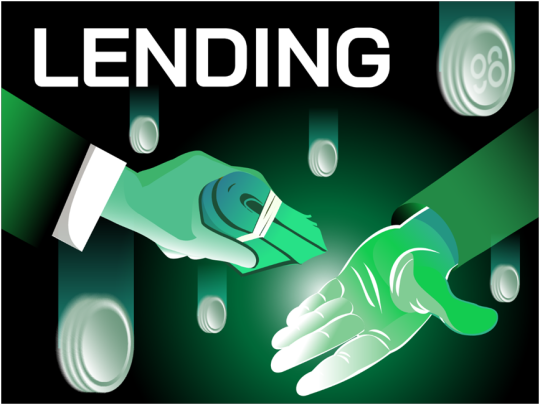
Lending is a way you lend idle assets. When the loan expires, you will receive both the principal and the interest. Cryptocurrency lending is attractive because it passively secures income by avoiding market fluctuations and is correlated with interest rates.
In the past, when the cryptocurrency market was not too developed, investors often loaned some key coins such as BTC, ETH, etc. Today, thanks to the strong development of DeFi, lending has expanded. more. Accordingly, you can lend any coin/token you own to earn interest.
Even so, lending itself is still risky if the price of the coin you're lending to falls during the loan term.
Example: You open a BTC extend. The interest rate is 1.6%/year for 14 days.
July 16, 2021 (starting lending): BTC price is $55.
July 30, 2021 (principal + interest payment): BTC price is $50.
If you lend 5 BTC, your estimated principal and interest will be: 5 + 5 x 1.6% x 14/365 = 5,003 BTC, equivalent to $275,165 (calculated at the time of lending).
But if calculated according to the BTC price at the time of interest payment, the total income will be 5,003 x 50 = $250,150, a decrease of more than 10%.
5. Hold Dividend Token

Dividend Token allows holders to receive passive income without having to have ownership in the organization.
Example of dividend token:
KuCoin Token (KCS).
50% of all exchange transaction fees are shared with token holders.
Holders receive a daily dividend payment.
Dividends will be paid in the form of KCS tokens. You can sell or add to your existing portfolio.
There is no minimum holding period, you can sell your tokens at any time.
You need a minimum of 6 KCS tokens to be rewarded.
Bibox Tokens (BIX), which pays owners 45% of Bibox's net transaction fee profits.
Bibox Dividend Bonus was introduced in April 2018. To qualify for a dividend payment, you just need to buy Bibox tokens, hold and lock at least 500 of them on the exchange. And then every week on Friday you will get 30-45% net trading profit share for that week.
Previously bonuses were paid out only if you made at least one trade during that week. But this has since been changed, which is a welcome update for investors looking for passive income.
In some cases dividend payout depends on whether the issuer has met performance milestones or targets and this is beyond your control.
In addition, dividends are distributed when the project is profitable. If the project starts to lose money, you may not receive regular dividends and the value of the tokens you are holding may plummet. Therefore, you should consider investing carefully before entering the market.
Conclusion:
Above, I introduced you to the concept and some ways to earn passive income in the crypto market. The above methods can give you a certain amount of passive income and financial freedom, but remember that “no lunch is free”. Either way has certain risks. Let's start with staking, do your research and make the right choice.
#nftslotmachine#gamblingplatform#cryptocurrency#staking#mining#lending#Yield Farming#Hold Dividend Token#adenenftslotmachine#adeneplatform#adenegamlingindustry#adeneunique#adenecryptocurrency#adenenftplatform
4 notes
·
View notes
Text

#Make Money From Home#Make Extra Money#extra money#money hacks#passive income#way to make money#earn passive income#earn money without investment#make money ideas
2 notes
·
View notes
Text
The Coprophagic AI crisis

I'm on tour with my new, nationally bestselling novel The Bezzle! Catch me in TORONTO on Mar 22, then with LAURA POITRAS in NYC on Mar 24, then Anaheim, and more!

A key requirement for being a science fiction writer without losing your mind is the ability to distinguish between science fiction (futuristic thought experiments) and predictions. SF writers who lack this trait come to fancy themselves fortune-tellers who SEE! THE! FUTURE!
The thing is, sf writers cheat. We palm cards in order to set up pulp adventure stories that let us indulge our thought experiments. These palmed cards – say, faster-than-light drives or time-machines – are narrative devices, not scientifically grounded proposals.
Historically, the fact that some people – both writers and readers – couldn't tell the difference wasn't all that important, because people who fell prey to the sf-as-prophecy delusion didn't have the power to re-orient our society around their mistaken beliefs. But with the rise and rise of sf-obsessed tech billionaires who keep trying to invent the torment nexus, sf writers are starting to be more vocal about distinguishing between our made-up funny stories and predictions (AKA "cyberpunk is a warning, not a suggestion"):
https://www.antipope.org/charlie/blog-static/2023/11/dont-create-the-torment-nexus.html
In that spirit, I'd like to point to how one of sf's most frequently palmed cards has become a commonplace of the AI crowd. That sleight of hand is: "add enough compute and the computer will wake up." This is a shopworn cliche of sf, the idea that once a computer matches the human brain for "complexity" or "power" (or some other simple-seeming but profoundly nebulous metric), the computer will become conscious. Think of "Mike" in Heinlein's *The Moon Is a Harsh Mistress":
https://en.wikipedia.org/wiki/The_Moon_Is_a_Harsh_Mistress#Plot
For people inflating the current AI hype bubble, this idea that making the AI "more powerful" will correct its defects is key. Whenever an AI "hallucinates" in a way that seems to disqualify it from the high-value applications that justify the torrent of investment in the field, boosters say, "Sure, the AI isn't good enough…yet. But once we shovel an order of magnitude more training data into the hopper, we'll solve that, because (as everyone knows) making the computer 'more powerful' solves the AI problem":
https://locusmag.com/2023/12/commentary-cory-doctorow-what-kind-of-bubble-is-ai/
As the lawyers say, this "cites facts not in evidence." But let's stipulate that it's true for a moment. If all we need to make the AI better is more training data, is that something we can count on? Consider the problem of "botshit," Andre Spicer and co's very useful coinage describing "inaccurate or fabricated content" shat out at scale by AIs:
https://papers.ssrn.com/sol3/papers.cfm?abstract_id=4678265
"Botshit" was coined last December, but the internet is already drowning in it. Desperate people, confronted with an economy modeled on a high-speed game of musical chairs in which the opportunities for a decent livelihood grow ever scarcer, are being scammed into generating mountains of botshit in the hopes of securing the elusive "passive income":
https://pluralistic.net/2024/01/15/passive-income-brainworms/#four-hour-work-week
Botshit can be produced at a scale and velocity that beggars the imagination. Consider that Amazon has had to cap the number of self-published "books" an author can submit to a mere three books per day:
https://www.theguardian.com/books/2023/sep/20/amazon-restricts-authors-from-self-publishing-more-than-three-books-a-day-after-ai-concerns
As the web becomes an anaerobic lagoon for botshit, the quantum of human-generated "content" in any internet core sample is dwindling to homeopathic levels. Even sources considered to be nominally high-quality, from Cnet articles to legal briefs, are contaminated with botshit:
https://theconversation.com/ai-is-creating-fake-legal-cases-and-making-its-way-into-real-courtrooms-with-disastrous-results-225080
Ironically, AI companies are setting themselves up for this problem. Google and Microsoft's full-court press for "AI powered search" imagines a future for the web in which search-engines stop returning links to web-pages, and instead summarize their content. The question is, why the fuck would anyone write the web if the only "person" who can find what they write is an AI's crawler, which ingests the writing for its own training, but has no interest in steering readers to see what you've written? If AI search ever becomes a thing, the open web will become an AI CAFO and search crawlers will increasingly end up imbibing the contents of its manure lagoon.
This problem has been a long time coming. Just over a year ago, Jathan Sadowski coined the term "Habsburg AI" to describe a model trained on the output of another model:
https://twitter.com/jathansadowski/status/1625245803211272194
There's a certain intuitive case for this being a bad idea, akin to feeding cows a slurry made of the diseased brains of other cows:
https://www.cdc.gov/prions/bse/index.html
But "The Curse of Recursion: Training on Generated Data Makes Models Forget," a recent paper, goes beyond the ick factor of AI that is fed on botshit and delves into the mathematical consequences of AI coprophagia:
https://arxiv.org/abs/2305.17493
Co-author Ross Anderson summarizes the finding neatly: "using model-generated content in training causes irreversible defects":
https://www.lightbluetouchpaper.org/2023/06/06/will-gpt-models-choke-on-their-own-exhaust/
Which is all to say: even if you accept the mystical proposition that more training data "solves" the AI problems that constitute total unsuitability for high-value applications that justify the trillions in valuation analysts are touting, that training data is going to be ever-more elusive.
What's more, while the proposition that "more training data will linearly improve the quality of AI predictions" is a mere article of faith, "training an AI on the output of another AI makes it exponentially worse" is a matter of fact.
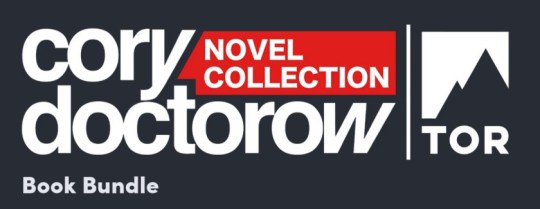
Name your price for 18 of my DRM-free ebooks and support the Electronic Frontier Foundation with the Humble Cory Doctorow Bundle.

If you'd like an essay-formatted version of this post to read or share, here's a link to it on pluralistic.net, my surveillance-free, ad-free, tracker-free blog:
https://pluralistic.net/2024/03/14/14/inhuman-centipede#enshittibottification

Image:
Plamenart (modified)
https://commons.wikimedia.org/wiki/File:Double_Mobius_Strip.JPG
CC BY-SA 4.0
https://creativecommons.org/licenses/by-sa/4.0/deed.en
#pluralistic#ai#generative ai#André Spicer#botshit#habsburg ai#jathan sadowski#ross anderson#inhuman centipede#science fiction#mysticism
549 notes
·
View notes
Text
Unveiling the Price Tag: Renting a House in Portugal
Welcome to the beautiful landscapes of Portugal, where the allure of renting a house beckons. Whether you are dreaming of a cozy apartment in Porto or seeking the hidden gems scattered across the country, Portugal offers a myriad of options for those looking to settle in. Embracing the quintessential charm of the "pearls of Portugal," renting a house here unveils a world of culture, cuisine, and captivating experiences waiting to be explored. Whether you are considering a move or simply captivated by the idea of residing in this European gem, understanding the cost of renting a house in Portugal is a crucial step towards turning your dreams into reality.
Housing Market Overview
The housing market in Portugal offers a diverse range of options for those seeking to rent a house. From the picturesque city of Porto to the hidden gems scattered throughout the country, Portugal boasts a variety of properties to suit different preferences and budgets.
Whether you are looking for a quaint apartment in the heart of a bustling city like Lisbon or a charming villa by the coast, Portugal has something for everyone. The availability of rental properties is relatively high, providing ample choices for individuals and families considering a move to this beautiful country.
Furthermore, with the rise of digital nomadism and remote work opportunities, Portugal has become an attractive destination for those looking to combine work and leisure living. The ease of obtaining residency through programs like the Golden Visa or D7 Visa has also contributed to the growing interest in living in Portugal for the long term.
Visa Options for Living in Portugal
For those considering moving to Portugal, there are several visa options available. One popular choice is the Golden Visa Portugal program, which offers residency permits to investors. Another option is the D7 visa, which is suited for those with passive income. Additionally, digital nomads looking to live and work in Portugal can explore visa options tailored to their needs.
Portugal's Golden Visa program has gained popularity among individuals seeking to invest in real estate or other assets. This visa allows for residency in Portugal and the potential for permanent residency or citizenship in the future. For moving to portugal interested in making a financial investment in Portugal, the Golden Visa offers a pathway to living in this beautiful country.
The D7 visa is an attractive option for individuals with regular passive income, such as retirees or freelancers. This visa allows for residency in Portugal without the requirement of engaging in local employment. Those looking to enjoy the laid-back lifestyle and favorable climate of Portugal while maintaining their income sources may find the D7 visa to be a suitable choice.
Tips for Renting in Porto
When considering renting a house in Porto, it's crucial to explore various neighborhoods to find the one that best suits your preferences. Porto offers a diverse range of areas, each with its own unique charm and atmosphere. Whether you prefer a bustling urban setting or a quieter residential area, taking the time to visit different neighborhoods can help you make an informed decision.
Before signing a rental agreement in Porto, be sure to carefully review the terms and conditions outlined in the contract. Pay close attention to details such as the monthly rent, deposit requirements, and any additional fees or charges. It's also advisable to clarify maintenance responsibilities with the landlord to ensure a smooth renting experience.
To navigate the rental process in Porto effectively, consider seeking assistance from a local real estate agent or relocation specialist. These professionals can provide valuable insights into the rental market, help negotiate terms on your behalf, and offer guidance on important paperwork. By leveraging their expertise, you can streamline your search for the perfect rental property in Porto.
#Portugal houses for rent#Porto house rentals#moving to portugal#buy a property in portugal#Portugal visas#golden visa Portugal#D7 visa Portugal#digital nomad Portugal#living in Portugal 2024
1 note
·
View note
Text
No Income Documentation Loans Need Now Income Proof For Sure!
For the financial growth and wealth accumulation investing in real estate can be the best idea. Serving as a reliable source of passive revenue for investors, property ownership can provide a steady stream of rental income. Sprawling bustling commercial spaces to farmlands and from towering skyscrapers to humble homes real estate includes a vast landscape of property. Real estate is not just about brick and mortar it is more than that; it is a fulfilling fundamental for human needs for shelter, community, and commerce. Real estate market is very diverse and dynamic, and it plays a crucial role in shaping our lives and communities. It is because it’s a reflection of societal values, economic dynamics and a reflection of human aspirations.

Take the no appraisal refinances now
Looking after loans, then loans are the essential tools that serves businesses, individuals and governments to access capital for various purposes. Whether it is buying property or home, covering unexpected expenses or funding a business venture, loans help one to achieve goals and manage financial needs. No appraisal loans are also known as streamline refinances or no-appraisal refinances. This is the mortgage refinancing options that allow homeowners to streamline the process of refinancing without requiring a new home appraisal. To simplify the refinancing process and to reduce the paperwork, this loan is designed. Typically lenders require a home appraisal to assess the current market value of the property but this appraisal helps lenders determine the loan-to-value ratio.
Income documents are not needed for sure
There are variety types of loans that are tailored to different circumstances and needs. Some are designed to finance the purchase of real estate properties and some loans are typically unsecured, meaning they don't require collateral but may have higher interest rates as a result. No income documentation loans are the type of mortgages that allow borrowers to apply for a loan without providing detailed proof of their income. The simplicity and flexibility of this loan make it more popular among real estate buyers and investors.
#no income documentation loans#no appraisal loans#Flexible loan terms#best loan providers#fix and flip financing
0 notes
Text
Unlock Financial Success with Affiliate Marketing: Your Guide to Making Money in 2024
Are you tired of the daily grind and looking for a way to earn money from the comfort of your home? Affiliate marketing might be the answer you’ve been searching for. With the right strategies and tools, you can build a successful affiliate marketing business and achieve financial freedom. In this article, we'll walk you through the steps to become a successful affiliate marketer in 2024 and show you how Quick Profit Formula X can accelerate your journey to financial success.
What is Affiliate Marketing?
Affiliate marketing is a performance-based marketing model where you promote products or services from other companies. When someone purchases through your referral link, you earn a commission. It’s a simple and effective way to earn money without the hassle of creating your own products.
Why Choose Affiliate Marketing?
1. Low Barrier to Entry: You don’t need a large investment to start. A computer and internet connection are enough to begin.
2. Flexibility: Work from anywhere and choose your own hours. It’s perfect for those looking to earn extra income or build a full-time business.
3. Passive Income Potential: Once you set up your system, you can earn money 24/7.
Steps to Succeed in Affiliate Marketing in 2024
1. Select a Profitable Niche
Choosing the right niche is crucial for your success. A niche is a specific segment of the market with a particular interest. Here are some tips to choose the right niche:
• Passion and Interest: Pick a niche you are passionate about. It will be easier to create content and stay motivated.
• Market Demand: Ensure there is a demand for the products in your niche. Use tools like Google Trends to see what people are searching for.
• Low Competition: Find a niche with low competition but high demand. This will give you a better chance to stand out.
2. Build Your Online Platform
Your online platform is where you will promote your affiliate products. Here’s how to set it up:
• Create a Website or Blog: This will be your main hub. Choose a simple and user-friendly design.
• Start a YouTube Channel: Video content is engaging and can help you reach a wider audience. Share product reviews, tutorials, and tips.
• Utilize Social Media: Platforms like Instagram, Facebook, and Twitter can help you connect with your audience and promote your content.
3. Produce High-Quality Content
Content is the key to attracting and retaining your audience. Focus on creating valuable and engaging content. Here are some content ideas:
• Product Reviews: Provide detailed and honest reviews of the products you promote.
• How-To Guides: Help your audience solve problems or achieve goals with step-by-step guides.
• Comparison Articles: Compare different products to help your audience make informed decisions.
4. Build and Engage Your Email List
Email marketing is a powerful tool in affiliate marketing. It allows you to communicate directly with your audience. Here’s how to build and engage your email list:
• Offer Freebies: Provide a free resource like an eBook or a checklist in exchange for email sign-ups.
• Send Regular Newsletters: Keep your audience engaged with regular updates, tips, and promotions.
• Segment Your List: Send targeted emails based on your audience’s interests and behaviors for better results.
5. Drive Traffic with SEO
Search Engine Optimization (SEO) is essential for driving organic traffic to your website. Here’s how to optimize your content for search engines:
• Keyword Research: Find relevant keywords with high search volume and low competition.
• On-Page SEO: Use your keywords in titles, meta descriptions, and throughout your content.
• Backlink Building: Reach out to other websites in your niche for backlinks. This can improve your search engine rankings.
6. Analyze and Improve Your Performance
Regularly analyzing your performance is crucial for your success. Use tools like Google Analytics to track your traffic, conversion rates, and other key metrics. This will help you understand what’s working and what needs improvement.
How Quick Profit Formula X Can Help You Succeed
Quick Profit Formula X is a comprehensive platform designed to help you succeed in affiliate marketing. Here’s how it can help you achieve your financial goals:
• Step-by-Step Training: Learn everything you need to know about affiliate marketing, from the basics to advanced strategies.
• Expert Insights: Get tips and advice from experienced affiliate marketers who have achieved significant success.
• Proven Strategies: Discover methods that have been tested and proven to work in the affiliate marketing industry.
• Supportive Community: Join a community of like-minded individuals who can offer support and advice.
Ready to start your journey to financial freedom? Visit QuickProfitFormulaX.com to learn more and get started today!
1 note
·
View note